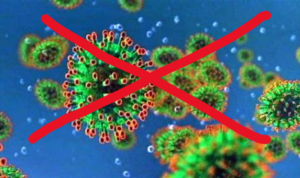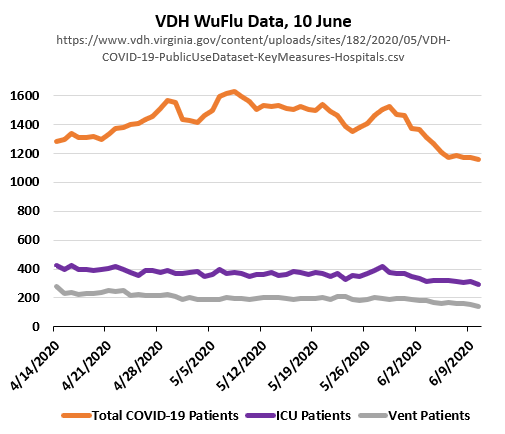by James A. Bacon
There’s been a lot of recent discussion in the media about a “second wave” of the COVID-19 virus this fall when days grow shorter and temperatures drop. Maybe it will happen, but I doubt it will be as virulent or as deadly as the first wave. I’m optimistic we’re making significant progress in learning to manage and live with the disease.
According to Virginia data published the morning, 658 new cases were confirmed from 8,451 new tests. The 7.9% “positive” rate continues a steady decline. Here’s an amazing figure: The number of COVID-19 patients in Virginia hospitals fell to 959, the first day under 1,000 since the Virginia Hospital and Healthcare Association began reporting the numbers in early April. Yesterday also saw the fewest patients held in ICUs and the fewest on ventilators as well.
Seven deaths were reported, five of which were connected to long-term care facilities. To the extent that there is a public emergency in Virginia — contracting the virus is not an emergency, only dying from it is — the crisis is still confined primarily to nursing homes.
While the incidence of COVID-19 apparently has ticked back up in some other states, I see no evidence in the statistics of a resurgence in Virginia. The protest marches in defiance of limits on crowd size have had no discernible effect; the partial reopening of businesses has had no discernible effect.
Longer term, we have several things going in our favor:
- We are far from developing “herd immunity,” in which 70% to 90% of the population needs to survive and acquire a resistance to the disease. However, tens of thousands (maybe hundreds of thousands) of Virginians likely have developed immunity or resistance, which will serve to slow the transmission.
- Most places of commerce and employment have adopted best practices for limiting the transmission of the virus, while many Virginians (especially the most vulnerable) continue to voluntarily wash hands, wear masks and self-isolate.
- The Virginia Department of Health (VDH) and the nursing home industry appear to be finally getting a grip on disease transmission in nursing homes, which account for a majority of all COVID-related deaths in the state.
- Although it has stumbled in hiring a force of contact tracers, VDH will get them hired eventually. I’m not terribly hopeful they will make much difference in halting the spread of the virus in the general population, but I think they will make a difference in controlling outbreaks, which have accounted for 17% of all cases.
- As medical practitioners learn more about how the disease is transmitted, individuals, businesses and public health authorities can better adapt their strategies for avoiding infection. As docs and hospitals learn more about how to treat the disease, fewer people will die from it.
We may never be able to exterminate COVID-19, as we have done with smallpox, but I am optimistic that we can learn to live with it without disrupting everyone’s lives and wrecking the economy.




